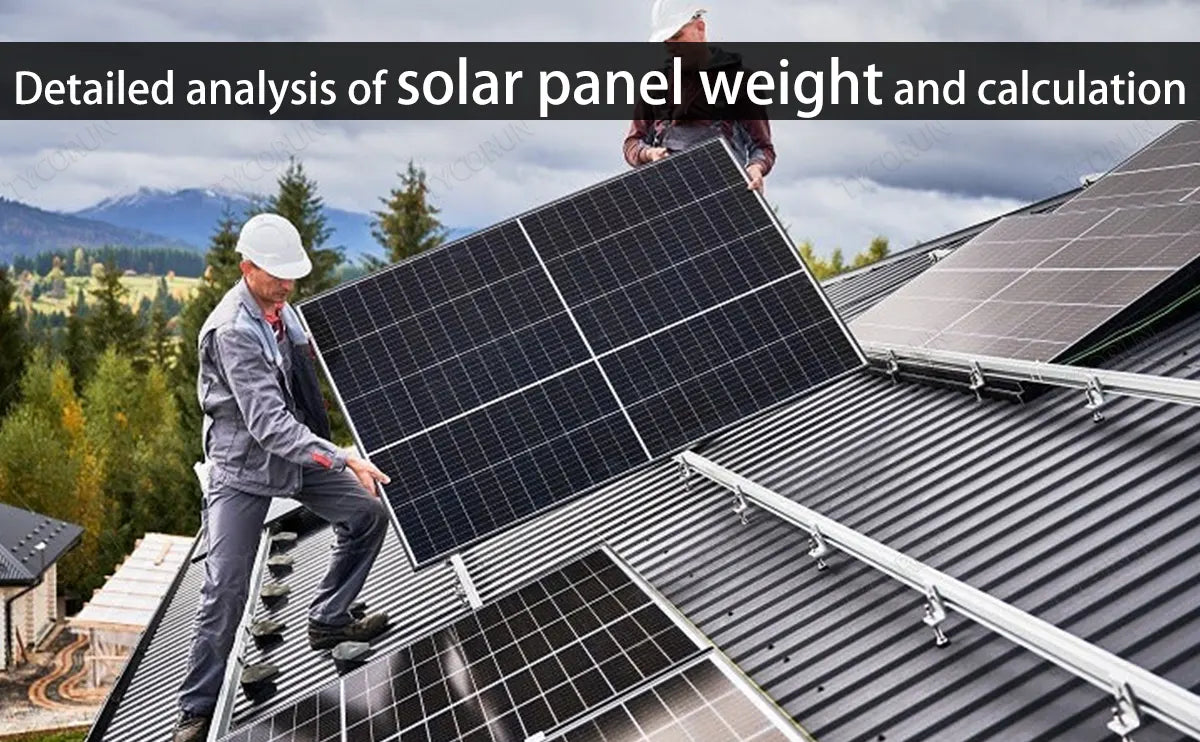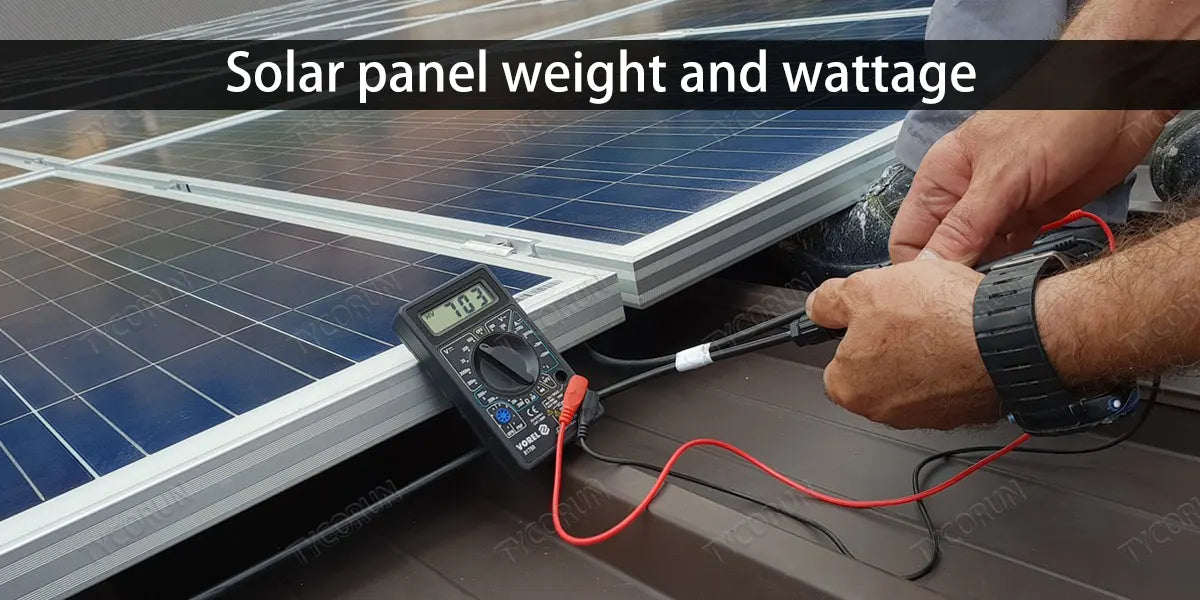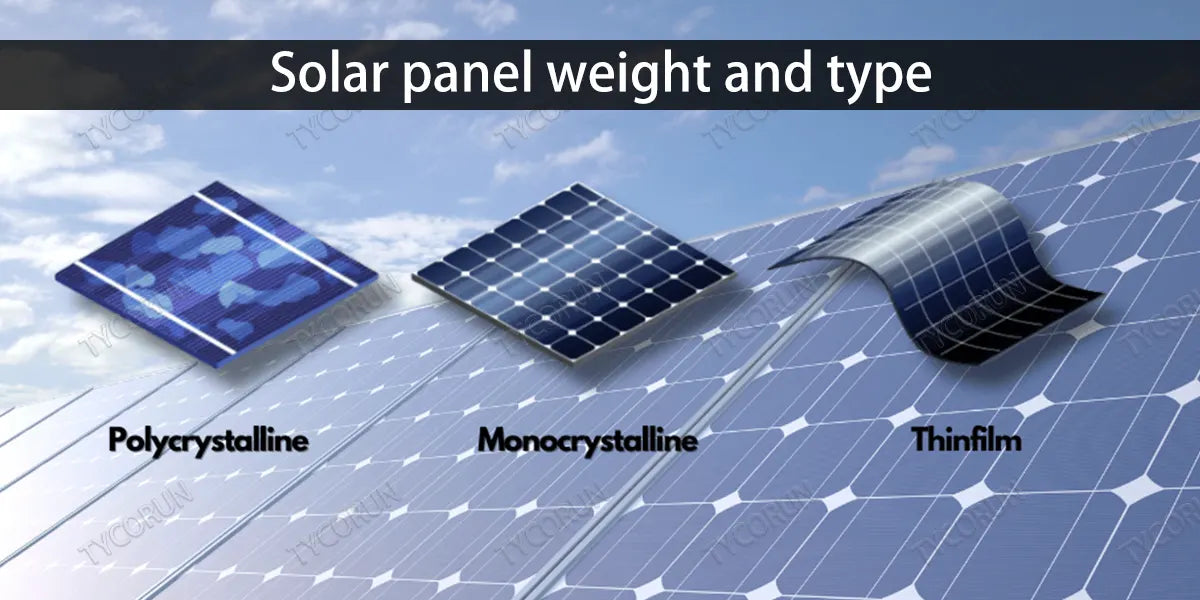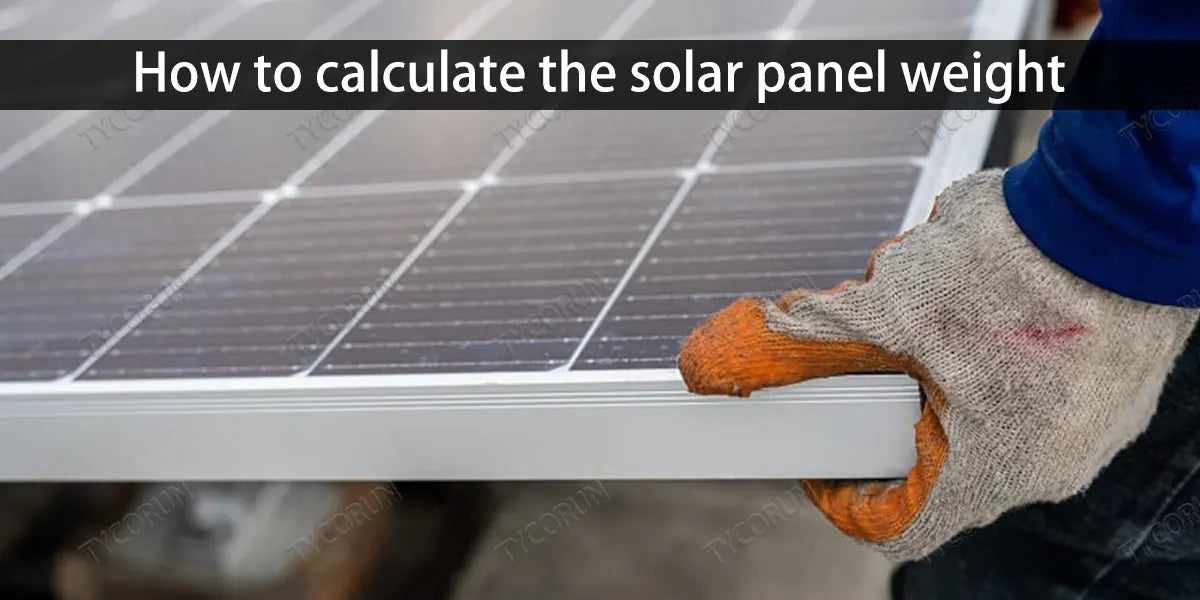
Main content:
- Factors that affect the solar panel weight
- Solar panel weight and wattage
- Solar panel weight and dimensions
- Solar panel weight and material
- Solar panel weight and type
- How much does a solar panel weigh
- How to calculate the solar panel weight
- Recommendations for reducing of solar panel weight
- Conclusion
The solar panel weight depends on several factors, including the size, material, type, and more of the solar panel. In general, solar panels weigh between 18kg and 36kg.
For large-scale photovoltaic power station, it is important to consider the solar panel weights and other factors to ensure the safe operation of the power plant.
1. Factors that affect the solar panel weight
① Solar panel weight and wattage
There is a relationship between the solar panel weights and wattage, but this relationship depends on a variety of factors. Such as the material, size, design. Here are some common solar panel weight and wattage data for reference:
Polycrystalline silicon solar panel: A polycrystalline silicon solar panel with a wattage of 250W will weigh about 18 - 23kg.
Monocrystalline silicon solar panel: A monocrystalline silicon solar panel with a wattage of 300W weighs about 19 - 24 kg.
It is important to note that the higher the wattage of a solar panel, the greater its size and weight, but at the same time it produces more electricity. In practice, the solar panel weights is also affected by a variety of factors, such as mounting method, bracket material, angle, power inverter 3000w and orientation.

Therefore, when choosing a solar panel, it is necessary to comprehensively consider factors such as its performance, size, weight, installation requirements and usage scenarios to choose the most suitable solar panel weight.
② Solar panel weight and dimensions
The larger the solar panel size, the higher the material used and therefore the weight. Commonly used solar panel sizes are 1.65m×0.99m, 1.95m×0.99m, 2m×1m, etc.
Among them, the 1.65m × 0.99m is generally between 18kg and 24kg, the 1.95m × 0.99m is generally between 22kg and 30kg, and the 2m × 1m is generally between 28kg and 36kg.
③ Solar panel weight and material
The material of the solar panel will also affect its weight. In general, materials commonly used in the manufacture of high efficiency solar panels include monocrystalline silicon, polycrystalline silicon, and amorphous silicon.
Among them, the weight will also vary between different materials. Monocrystalline silicon solar panels are generally heavier than polycrystalline silicon solar panels because monocrystalline silicon requires more materials in the manufacturing process and is more complex.
④ Solar panel weight and type
There are many types of solar panels, such as monocrystalline silicon, polycrystalline silicon, amorphous silicon, flexible, thin film, etc. Different types of solar panels vary greatly in weight.

Flexible solar panels are generally lighter than regular silicon wafer solar panels because they are manufactured using flexible materials. Thin film solar panels are much lighter in weight than regular wafer solar panels, making them easier to handle.
Therefore, when installing solar panels, it is necessary to have sufficient planning and preparation, and to think carefully before proceeding with the installation. If it is installed on a roof or other high ground, you must pay attention to safety issues and check whether the weight of the equipment meets the safety requirements before formal installation.
The solar panel weight is not very heavy, but there are factors to consider when installing it. As technology and materials continue to evolve, solar panels will become lighter and lighter, making them more portable and easier to install in the future.
2. How much does a solar panel weigh
Let's take a closer look at the solar panel weights. The solar panel weight depends on a number of factors, including panel size, material, and construction. The most common solar panels are made of silicon, which is why they have a certain weight.
However, there are also new solar panels made of lighter materials, such as thin film solar panels (like thin film solar cell), which are much lighter. Secondly, the solar panel weights is also related to their size. In general, the larger the size, the heavier the solar panel.

For example, a solar panel with an area of 2 square meters may be twice as heavy as a solar panel with an area of 1 square meter. Finally, it is important to note that while the solar panel weight is an important physical property, we should pay more attention to its power and efficiency when evaluating its performance.
For example, a solar panel that weighs less but is more efficient may be much better than a solar panel that is heavy but inefficient. There is no fixed value for the solar panel weight, and it can be affected by a variety of factors. When choosing a solar panel, in addition to weight, you should also consider various other factors to choose the most suitable product for your needs.
3. How to calculate the solar panel weight
The solar panel weights varies depending on the material, size, bezel material, etc. Solar panel weight is mainly composed of solar panels, frames, and mounting structures. The weight of the solar panel affects the installation and load-bearing design, so it must be calculated accurately.
The calculation formula is as follows:
Solar panel weight (kg) = area (m²) x specified weight (kg/m²)

The weight is based on the solar panel size, material thickness, and bezel material. In general, solar panels with polycrystalline or monocrystalline silicon weigh between 10 kg and 30 kg. In addition, the solar panel weights coated on both sides of tempered glass or polycarbonate will vary.
4. Recommendations for reducing of solar panel weight
- Use lightweight materials
The solar panel weights can be reduced by using lightweight materials, such as aluminum alloy frames or polycarbonate materials.
- Reduce size
Reducing the size of solar panels can also reduce weight, but care must be taken not to affect power generation efficiency.
- Change the arrangement
By changing the arrangement of the solar panels, such as spacing or orientation, the weight of the solar panels can be reduced and the power output can be increased.

It is not difficult to calculate and reduce the solar panel weights. The key is to understand the factors that affect the solar panel weights. The solar panel weights can be effectively reduced by using lightweight materials, reducing the size of solar panels, and changing the arrangement of solar panels.
5. Conclusion
In summary, solar panels can weigh a wide range of kilograms, from a few kilograms to tens of kilograms, depending on the type, size, and installation of the panel.
When installing solar panels, it is important to consider the impact of weight of the panels on the roof or other supporting structures to ensure that there is sufficient load-bearing capacity.
Related articles: Polycrystalline vs single crystal, install solar panel, home solar panels manufacturers in the world